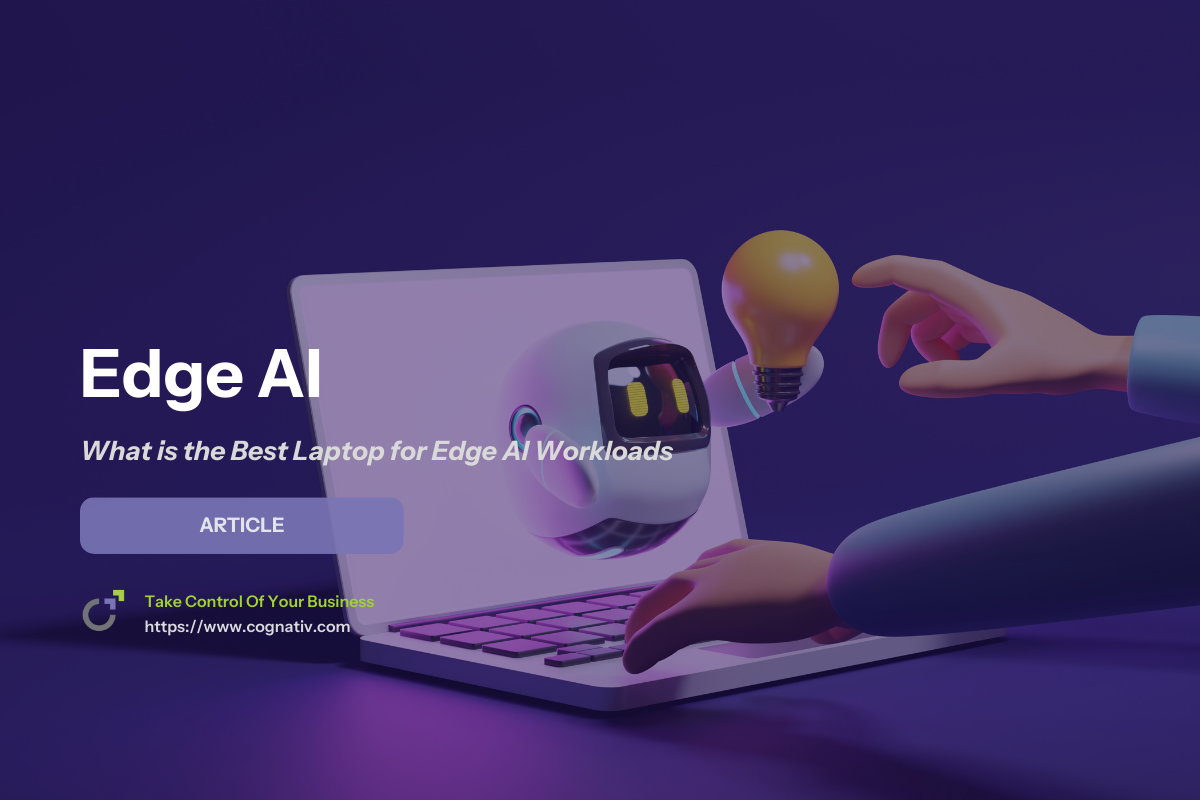What is the Best Laptop for Edge AI Workloads?
In today's fast-paced digital world, having a laptop that can efficiently handle edge AI workloads is essential for professionals and enthusiasts alike. Whether you're developing AI models, running complex machine learning tasks, or simply leveraging AI-powered applications, the right laptop can make all the difference in performance, battery life, and overall productivity. This post explores the top laptops designed to meet these demands in 2025.
Key Takeaways:
-
Advanced AI capabilities combined with powerful CPUs and GPUs are crucial for handling edge AI workloads effectively.
-
Long-lasting battery life ensures that you can work on demanding AI tasks throughout the day without interruption.
-
Specialized hardware like Neural Processing Units (NPUs) and optimized software accelerate AI performance directly on the device, reducing reliance on cloud computing.

Introduction to Edge AI
Edge AI is no longer just a buzzword—it’s rapidly becoming the foundation for next-generation computing. At its core, edge AI refers to processing and analyzing AI tasks directly on the device, or at the edge of a network, instead of relying solely on cloud infrastructure. This shift brings several advantages: reduced latency, greater privacy, improved power efficiency, and faster real-time decision-making.
For professionals, students, and researchers, this means the ability to run AI workloads such as computer vision, generative AI, or natural language processing directly on a laptop without constantly sending data back and forth to a server. It’s a crucial evolution for industries like healthcare, finance, retail, and autonomous systems where milliseconds can make the difference between success and failure.
This is where AI laptops enter the scene. Unlike traditional consumer laptops, AI laptops are designed to handle edge AI workloads efficiently. They feature CPUs and GPUs optimized for machine learning, ample RAM and storage for handling massive datasets, and increasingly, specialized hardware like Neural Processing Units (NPUs) to accelerate AI workloads.
In 2025, the best laptops for edge AI workloads are defined by three pillars:
-
Advanced AI capabilities such as Intel AI Boost or Apple Intelligence features.
-
Long battery life that supports all-day productivity without sacrificing performance.
-
Excellent performance across CPU, GPU, and memory to handle the most demanding AI workloads.
If you’re an AI researcher, developer, or business professional curious about which laptop can actually meet these needs, let’s break down the essential components and then explore the best AI laptops of 2025.
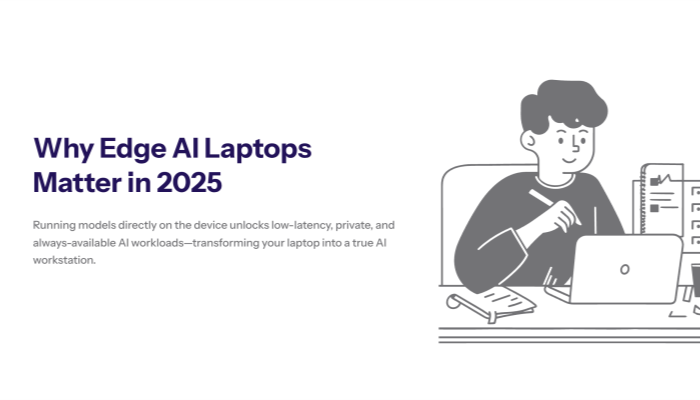

Key Components for AI
When shopping for the best AI laptops, it’s essential to understand the core components that make a laptop capable of running AI workloads effectively. Let’s walk through the most critical parts.
Central Processing Unit (CPU)
The CPU is the brain of any laptop. For AI workloads, having a robust CPU ensures that your system can handle parallel processing tasks and manage multiple AI programs without lag. In 2025, two key players dominate the AI PC landscape: Intel Core Ultra series and AMD Ryzen AI processors.
-
Intel Core Ultra 9 with Intel AI Boost: Intel’s latest lineup integrates Intel AI Boost, a specialized NPU designed to accelerate AI workloads on-device. This means tasks like data analysis, natural language processing, and even generative AI models can run faster and more efficiently without draining system resources.
-
AMD Ryzen AI: AMD continues to push boundaries with Ryzen AI chips, focusing on both raw performance and power efficiency. These CPUs deliver outstanding multi-threaded performance, making them ideal for training and testing complex AI models locally.
Why it matters?
-
CPU performance directly impacts how quickly you can iterate during professional AI development.
-
Developers working with frameworks like TensorFlow, PyTorch, or ONNX will notice the difference immediately when running simulations or training models.
In short, choosing a laptop with a top-tier Intel Core Ultra series or AMD Ryzen AI CPU ensures you have the necessary processing power for the most demanding AI workloads.
Graphics Processing Unit (GPU)
If the CPU is the brain, the GPU is the muscle behind AI performance. For edge AI workloads, a powerful GPU isn’t just about rendering graphics — it’s about accelerating computations for machine learning, generative AI, and natural language processing. Modern AI tasks rely heavily on parallel processing, which GPUs handle far more efficiently than CPUs.
Why GPUs Matter for AI Laptops?
-
AI acceleration: GPUs enable laptops to accelerate AI workloads like training neural networks, running inference tasks, and processing massive image datasets.
-
Real-world performance: When dealing with complex AI models, GPU performance often determines how quickly results are delivered.
-
Demanding AI workloads: Generative AI, large language models, and even AI-powered development tools all require the raw parallel power GPUs bring to the table.
Top GPU Options in 2025
-
NVIDIA GeForce RTX 40-Series: Still the gold standard for AI professionals. With CUDA cores, Tensor cores, and AI-enhanced DLSS 3.5, these GPUs are designed to run AI applications efficiently. NVIDIA GPUs are also widely supported by AI frameworks, which makes them a safe choice for professional AI development.
-
Intel Arc Graphics: Intel has been gaining traction with Intel Arc Graphics, offering outstanding performance for on-device AI. When paired with Intel Core Ultra processors, Arc GPUs enable a seamless ecosystem that enhances both graphics and AI workloads.
-
Integrated GPUs for lightweight AI tasks: Not every AI laptop needs a heavy-duty discrete GPU. For lighter AI programs like AI-powered productivity tools or basic AI benchmarks, modern integrated GPUs can deliver great battery life while still maintaining excellent performance.
In short, if you plan to run the most demanding AI workloads like training deep neural networks or working with large generative models, a dedicated GPU such as NVIDIA RTX or Intel Arc is essential. If your focus is lightweight AI acceleration and portability, an integrated GPU in a thin premium laptop could suffice.
RAM and Storage: Fuel for AI Workloads
While CPU and GPU get most of the spotlight, RAM and storage are equally important when choosing the best AI laptops in 2025. Without enough memory and fast storage, even the most powerful processors will be bottlenecked.
RAM for AI Workloads
-
16GB RAM minimum: For entry-level AI tasks, this is the baseline.
-
32GB RAM recommended: Essential for running complex AI models and multitasking between AI programs and other productivity tools.
-
64GB+ for professionals: If you’re working with large datasets, real-time AI applications, or heavy-duty parallel processing tasks, investing in higher RAM is critical.
Storage Options
-
NVMe SSDs: Today’s best AI laptops come with NVMe storage, which provides lightning-fast read/write speeds. This reduces model loading times and speeds up data analysis workflows.
-
1TB or higher capacity: Necessary for developers and researchers who store datasets locally. Smaller storage options fill up fast when dealing with AI workloads.
When combined, ample RAM and fast SSD storage ensure that your laptop delivers real-world performance without slowdowns, even when working on professional AI development projects.

Evaluating AI Laptops in 2025
With dozens of laptops on the market, how do you evaluate which one is the best laptop for edge AI workloads? It comes down to a mix of hardware, AI features, and practical usability.
Key Considerations
-
AI performance: Look at AI benchmarks and AI tests. How well does the laptop handle running real AI models?
-
Battery life: Can it last a full workday under AI-heavy use? Laptops with long battery life or even all-day battery life stand out.
-
Display quality: Since many AI workloads involve visuals (data plots, graphics, or video), a sharp OLED display or high-quality panel improves productivity.
-
Processing power: Balance of CPU, GPU, RAM, and storage to deliver exceptional performance without compromise.
AI Software and Tools
Another overlooked aspect is AI software. The best AI laptops in 2025 often ship with AI-powered tools built into the operating system. For example:
-
AI-powered security for biometric authentication and data encryption.
-
Apple Intelligence features on the MacBook Air for productivity and creative applications.
-
AI-powered laptops from Microsoft and HP with integrated neural processing units (NPUs) designed for AI acceleration.
When evaluating, don’t just look at specs — look at how the system integrates advanced AI capabilities directly into your workflow.
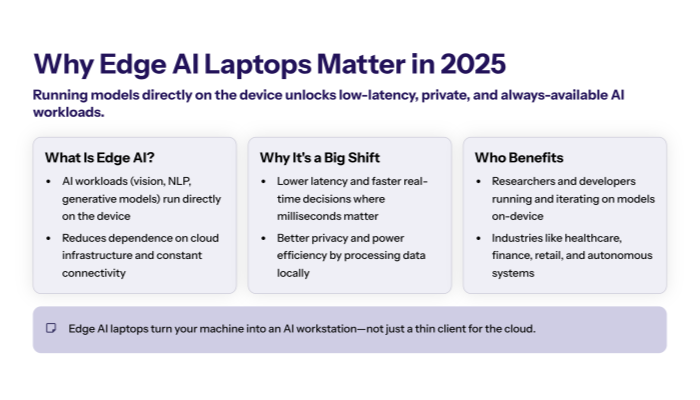

Top AI Laptop Picks for 2025
Now that we’ve outlined the key specs, let’s dive into the best AI laptops available in 2025. These laptops deliver the necessary processing power, extended battery life, and advanced AI features that users need for both business and research.
1. Dell XPS 15
-
Why it’s great: The Dell XPS remains one of the most popular laptops for AI professionals thanks to its balance of outstanding performance, portability, and excellent battery life.
-
Specs highlight: Intel Core Ultra 9 with Intel AI Boost, NVIDIA RTX 4070, up to 64GB RAM, and stunning OLED display.
-
Best for: Developers who need a great AI PC that can handle demanding AI workloads while also serving as a daily driver.
2. MacBook Air (M4 with Apple Intelligence)
-
Why it’s great: Apple’s MacBook Air continues to push the boundaries of AI performance with Apple Intelligence features. It’s fanless, lightweight, and offers incredible battery life.
-
Specs highlight: Apple M4 chip with integrated NPU, up to 24GB unified memory, and razor-sharp Retina display.
-
Best for: Business users looking for a sleek, AI business laptop with advanced AI capabilities for productivity and creative tasks.
3. HP Spectre x360
-
Why it’s great: Known for flexibility, the HP Spectre x360 combines 2-in-1 functionality with AI-powered enhancements. It’s portable yet powerful enough for AI workloads.
-
Specs highlight: Intel Core Ultra processor, Intel Arc Graphics, and AI-powered laptops features baked into Windows 12.
-
Best for: Professionals needing versatility and excellent performance for both work and AI tasks.
4. Lenovo ThinkPad X1 Carbon
-
Why it’s great: The classic business laptop redesigned for the AI era. With enterprise-grade security and AI-powered productivity tools, it’s built for serious work.
-
Specs highlight: AMD Ryzen AI CPU, 32GB RAM, lightweight build, all-day battery life.
-
Best for: Corporate and enterprise professionals who need a durable AI PC with great battery life.
5. Asus ZenBook 14
-
Why it’s great: A premium laptop that delivers advanced AI capabilities without breaking the bank. Known for its power efficiency and sleek build.
-
Specs highlight: Intel Core Ultra with Intel AI Boost, 16GB RAM, and USB-C ports for connectivity.
-
Best for: Students, researchers, and creators who want outstanding performance at a competitive price.
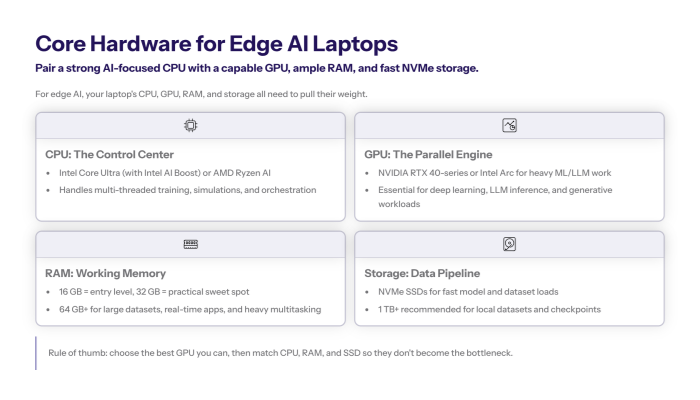

Best AI Laptops for Business and Power Users
While students and casual users benefit from midrange options, business professionals and power users require laptops that can handle the most demanding AI workloads while maintaining extended battery life and portability. These users often work with complex AI models, manage large datasets, and rely on their machines to deliver real-world performance in high-pressure environments.
Business Professionals
Business professionals are looking for the best AI laptops that provide reliability, AI-powered security, and long battery life. For example:
-
Lenovo ThinkPad X1 Carbon is an excellent AI business laptop, offering enterprise-grade encryption, advanced AI features, and excellent build quality.
-
MacBook Air with Apple Intelligence features is another standout, providing incredible battery life for travel and seamless integration with productivity and creative AI applications.
What matters most for businesses:
-
AI-powered productivity tools for faster workflows.
-
Excellent performance without overheating or throttling.
-
Great battery life that lasts through travel, meetings, and development.
Power Users
Power users — such as AI researchers, developers, and engineers — need raw computing power with the flexibility to run parallel processing tasks and train complex AI models directly on-device.
Recommended laptops for power users include:
-
Dell XPS 15 with NVIDIA RTX 4070:
A great AI PC that delivers both exceptional performance and versatility. -
HP Spectre x360 with Intel Arc Graphics:
Portable, powerful, and equipped with AI acceleration features. -
Asus ZenBook 14 with Intel Core Ultra:
Delivers outstanding performance in a compact form factor, making it an ideal blend of power efficiency and mobility.
What matters most for power users:
-
AI acceleration features like Intel AI Boost or NPUs for on-device performance.
-
OLED display options for better data visualization and immersive experience when working with AI-generated media.
In short: Business professionals lean toward security, stability, and all-day battery life, while power users demand raw power and advanced AI capabilities.
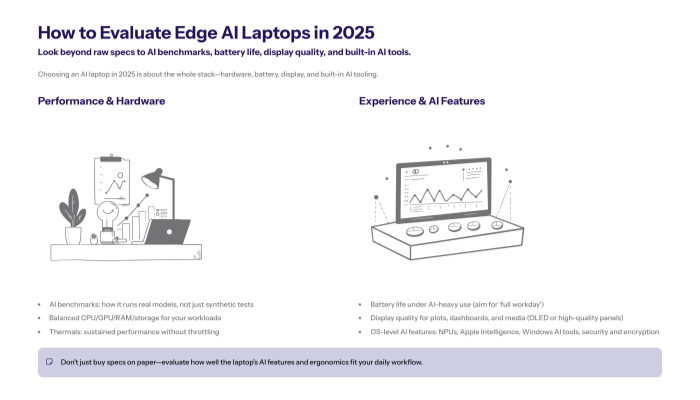

The Future of AI Laptops
Looking ahead, the future of AI laptops in 2025 and beyond is bright. With AI acceleration hardware, AI-powered software, and continued optimization for on-device AI, laptops are becoming more specialized and powerful than ever before.
What’s Next for AI PCs?
-
Neural Processing Units (NPUs) Everywhere
By 2026, nearly all major laptop brands will integrate NPUs into their chips, enabling faster and more efficient AI tasks like natural language processing, image recognition, and real-time AI applications without cloud dependence.
-
Apple Intelligence Features Expanding
Apple’s AI-powered laptops are only scratching the surface. Expect tighter integration between macOS, iOS, and AI-based development tools, turning the MacBook Air and MacBook Pro into even more attractive best AI laptops.
-
Greater Focus on Battery Life
AI workloads can drain laptops quickly, but advancements in chip design will deliver all-day battery life with excellent performance. The balance between power efficiency and AI performance will define the next generation of laptops.
-
Advanced AI Features for Productivity
Expect AI-powered scheduling assistants, AI benchmarks that optimize workflows automatically, and smarter security features. These advanced AI capabilities will transform laptops into more personalized, adaptive tools.
-
Seamless AI Development Tools
Future laptops will ship with pre-installed development tools optimized for AI frameworks, enabling professionals to start building and training models out of the box.
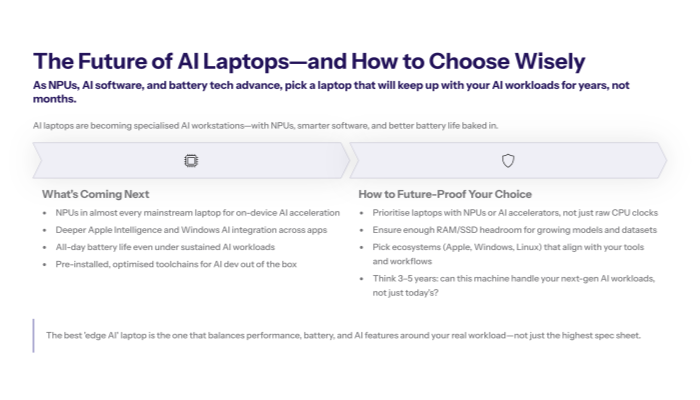

Conclusion: Choosing the Best Laptop for Edge AI Workloads
The race for the best laptop for edge AI workloads in 2025 isn’t about raw specs alone — it’s about finding the right balance between AI performance, battery life, processing power, and AI features that match your specific needs.
-
For business users: The Lenovo ThinkPad X1 Carbon and MacBook Air M4 16GB stand out for AI business laptop functionality, offering security, reliability, and incredible battery life.
-
For power users: The Dell XPS 15, HP Spectre x360, and Asus ZenBook 14 deliver the necessary processing power and advanced AI capabilities to handle complex AI models and demanding AI workloads.
-
For everyday AI tasks: Even thinner laptops with integrated GPU options can now run on-device AI efficiently, making them a viable entry point into the AI PC ecosystem.
As we move deeper into the AI-driven decade, one thing is clear: the best AI laptops are no longer niche machines — they’re mainstream, portable, and powerful enough to support everything from AI-powered productivity to professional AI development. If you’re considering investing in a laptop in 2025, choosing one with advanced AI features, excellent performance, and great battery life is the smartest way to future-proof your workflow.

